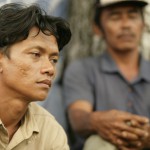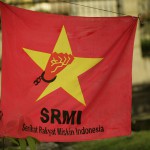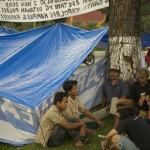Here in Riau, Indonesia, signs of the struggle to save the last of Sumatra’s forest is everywhere. Daily, the papers cover stories of timber and oil palm companies destroying forests, engaging in corruption, driving land conflicts, sponsoring violence, and marginalizing indigenous peoples.
Today, on the way to a meeting with the local NGO Elang, I passed villagers from the Kampar Peninsula, a carbon-rich and biodiverse ecoystem that is under attack by Sinar Mas’ oil palm operations and their timber division Asia Pulp and Paper (APP), on a hunger strike.
In front of the provincial parliament building, a group of men and women from the village of Kijang Kejo have set up a plastic tarp and banner, announcing to Riau’s elected officials that they will not eat until the oil palm plantation PT Arindo Tri Sejahtera, who stole their land and then paid thugs to kill three of their family members, is brought to justice.
10 days into their hunger strike, the villagers are pale and weak, sleeping while motor bikes and buses fly by them on the road. They told me they have not been able to meet with any members of the provincial government, and were not sure how much longer they could last without food.
The group that owns this particular plantation, Surya Dumai, might be on the nastier end of the scale of dirty, dangerous, and destructive oil palm and timber companies, but this is how the resource extraction game is played here in Riau, Sumatra; buy the military, government, and media and trample any local people that dare to stand up for their rights.
APP and Sinar Mas have been shown to violate Indonesian law and human rights, but with the authorities in their pocket, it is us, the consumers of timber and palm oil, that must demand producers respect forests and the people who inhabit them.
David Gilbert is a Research Fellow at RAN. He has worked in the tropical forests of the Amazon and Indonesia, with a special focus on forest conservation and indigenous rights. He can be reached at davidgilbert@ran.org


